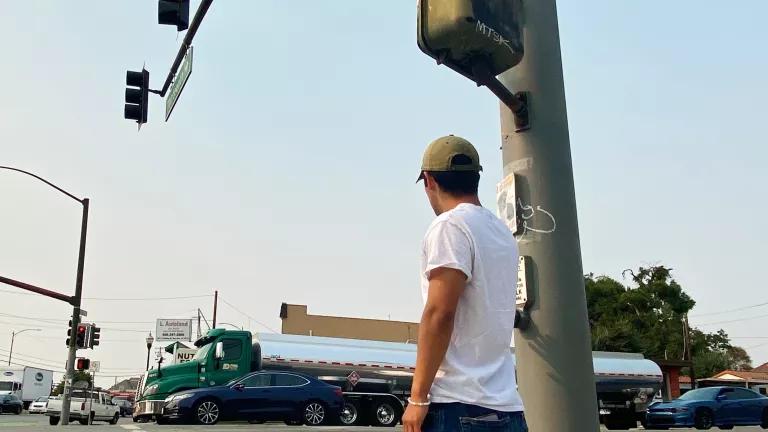Today President Obama will announce a third historic agreement to bring us cleaner cars and trucks, dramatically cutting carbon pollution and raising fuel economy for new cars, SUVs, minivans, and pick-ups built between 2017 and 2025. The latest Clean Car Peace Treaty builds on a 2009 agreement for 2012-16 vehicles, and a 2010 pact to clean up heavy-duty trucks and buses.
The standards issued under the first agreement will cut carbon pollution from 2016 model vehicles by 30 percent and raise their fuel economy to 35.5 miles per gallon. NRDC’s vehicle experts Roland Hwang and Luke Tonachel show how the latest standards will ratchet carbon pollution down to just over half the level of current vehicles, and will crank up fuel efficiency standards to 54.5 mpg by 2025. (Go to Roland's and Luke’s posts for the nitty-gritty on grams per mile of CO2 and miles per gallon for cars and light trucks.)
This is a huge reduction in the heat-trapping pollution that drives global warming, and it means huge savings for consumers. We’ll spend $80 billion per year less at the pump, and those billions will keep working in our economy instead of Iran’s, Saudi Arabia’s, and Venezuela’s. And we’ll create as many as 150,000 good new American jobs.
But maybe the most important result of the newest clean car agreement is what it shows about governing in today’s America. What a contrast between this and the rancor and dysfunction on Capitol Hill over the nation’s debt limit. While Congress is paralyzed in ideological gridlock, toying with sending the nation's economy over the cliff, the president, the auto companies, states, and environmentalists have, once again, shown what it means to govern and what can be accomplished by constructive compromise.
In the last half-century, it would be tough to find more implacable enemies than the car companies and advocates for cleaner air and higher mileage. We fought for decades over the Clean Air Act and Corporate Average Fuel Economy (CAFE). Over the last 10 years, California took the lead by setting its own carbon pollution standards under the Clean Air Act, with other states following suit. And a coalition of environmental organizations and states battled all the way to the Supreme Court, winning not one but two landmark rulings that it’s EPA’s job under the Clean Air Act to curb the pollution that causes global warming.
In a microcosm of the current debt ceiling stalemate, by late in the last decade some of the biggest firms in the auto industry had ground themselves into bankruptcy, while environmentalists found that their legal victories still had not translated into cleaner cars. The time was right for win-win solutions that cut pollution, cut oil dependence, saved consumers billions at the pump, and helped the car companies back to profitability in the new world of higher gas prices.
But it took leadership, partnership, and compromise.
In 2009 the Obama administration hammered out an agreement – backed by every car company, the United Auto Workers, states, and environmental organizations – on a consistent set of carbon pollution and fuel economy standards for 2012-16. The standards are jointly implemented by EPA, the National Highway Traffic Safety Administration (NHTSA), and the California Air Resources Board, acting under both the Clean Air Act and the Energy Independence and Security Act. In 2010, the administration forged a similar pact for highway trucks and other heavy vehicles. And now in 2011, the president’s team has reached a third agreement, which will do even more to cut pollution, cut our oil dependence, save consumers money, and create jobs than the first two historic pacts.
It’s more than ironic that the House of Representatives is voting this week on a funding bill with more than three dozen anti-health and anti-environmental “riders,” including one designed to block these very clean car agreements. It’s as though the House leadership, unable to compromise on even the nation’s most vital business, is bound and determined to reach out and block anyone else from governing and compromising to solve real national problems.
Yet even most ardent EPA-bashers may be starting to get it that this is not a winner for them. Rep. Ed Whitfield (R-KY) told Politico Pro (subscription required): "If these automobile manufacturers want to reach agreements with EPA, that's their business."
Let’s hope so.




